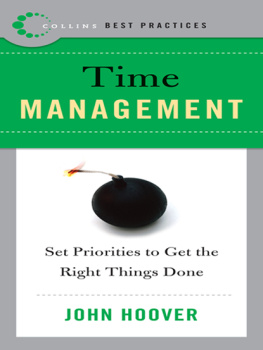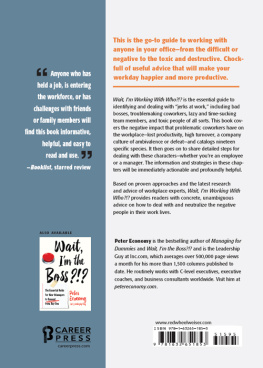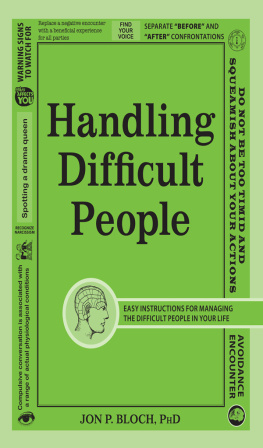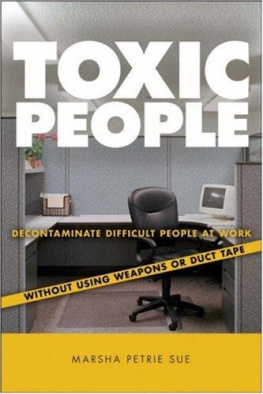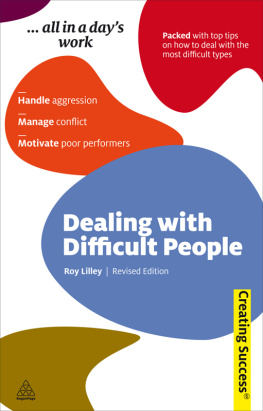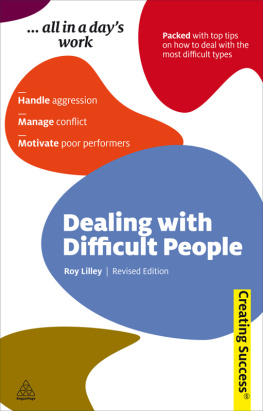Why are some people so difficult to work with? Whats the best way to deal with them? How can you cope with a boss whos a Slave Driver or a Bully? What about the colleague who shows up repeatedly in your office to chat about personal matters? Why are some managers able to take difficult people in stride, while others feel overwhelmed by them? How do you avoid becoming a difficult employee?
In this book, we distill the wisdom of some of the best minds in the field of human resources to help you manage difficult peopleperhaps one of the most challenging problems of the workplace. The language is simple and the design colorful to make the information easy to grasp.
Quizzes help you assess your knowledge of difficult people and how to handle them diplomatically. Case files show how people have managed difficult people effectively. Sidebars give you a big-picture look at the challenges inherent in managing a group with diverse personalities and highlight innovative, out-of-the-box solutions worth considering. Quotes from business leaders, psychologists, and human resources experts will motivate you as you interact daily with difficult people. Finally, in case you want to dig deeper into the literature of difficult people and management, we recommend some of the most important business books available. The authors of these books both influence and reflect todays thinking about handling difficult people effectively and related management issues. Understanding the ideas they cover will inspire you as a manager.
Even if you dont dip into these volumes, the knowledge you gain from studying the pages of this book will equip you to deal firmly, effectively, and insightfully with the difficult people you face every dayto help you make a difference to your company and in the lives of the people who support you.
T HE E DITORS
My main job was developing people. Of course, I had to pull out some weeds, too.
Jack Welch, former CEO of General Electric and author of Winning
F rom line supervisors to senior managers, todays leaders are in the business of developing their people, which means helping them develop strong and productive relationships. Your challenge as a manager is to form coalitions of willing, eager, and ambitious people within your realm of responsibility.
Self-Assessment Quiz
ARE DIFFICULT PEOPLE TAKING A TOLL ON YOU?
Read each of the following statements and indicate whether you agree or disagree. Then check your score and study the analysis at the end.
- I have difficult people reporting to me.
Agree Not Sure Disagree - I must work with difficult coworkers.
Agree Not Sure Disagree - I report to a difficult person as my boss.
Agree Not Sure Disagree - My subordinates take up too much of my time.
Agree Not Sure Disagree - My coworkers take up too much of my time.
Agree Not Sure Disagree - My superiors take up too much of my time.
Agree Not Sure Disagree - People who take up my time are difficult.
Agree Not Sure Disagree - Difficult people make me unproductive.
Agree Not Sure Disagree - Difficult people make their peers unproductive.
Agree Not Sure Disagree - Difficult people cost my organization money.
Agree Not Sure Disagree
Scoring
Give yourself 2 points for every question you answered Agree, 1 point for every question you answered Not Sure, and 0 points for every question you answered Disagree.
Analysis
1520 | You believe that difficult people are disruptive and that they waste time and other resources. Difficult people are a serious issue for you. |
1014 | You arent sure whether or not difficult people are a problem for you, for other people, or for your organization as a whole. You have thick skin or are in denial. |
| You arent convinced that difficult people are problematic. You are either right or oblivious to whats happening around youin which case you may be a difficult person yourself. |
Getting in your way, when you least expect or have the time to deal with them, will be difficult people.
If you observe enough managers over time, youll notice that some are far less annoyed than others by these problematic employees. Thats not because frazzled managers have a greater number of difficult people on their staff or that their difficult people are so much more challenging. Rather, serene managers have developed better skills for dealing with difficult people.
Every difficult person that you come into contact with is an opportunity for you to grow and develop into a stronger, more resilientand more serenemanager. Fortunately, the coping skills you need can be learned.
The exact cost of difficult people in the workplace is incalculable. Examining the subject is like trying to watch a skyscraper being built by peering through a knothole in a plywood construction fence. You are only able to see a portion of the complete picture at any given time.
The problem is not only that difficult people make everyone miserable, but also that they diminish your effectiveness and the effectiveness of those around you. Your effectiveness is a measure of how you get things done on time, under budget, with quality workmanship, and without overturning any apple carts, so that you get positive performance reviews, promotions, and raises.
Behind the Numbers
THE NEGATIVE MATH OF DIFFICULT PEOPLE
Difficult people often cause turnover, either because the difficult person decides to leave, is terminated, or causes the departure of someone else. According to one study on the effects of the U.S. Family Medical Leave Act, Turnover costs for a manager average 150 percent of salary, including tangible costs of hiring new workers and relocation, and intangible costs such as the new workers inefficiency and lost productivity while the job is vacant. When you do the math using this formula, heres how much it costs to replace employees at the following salary levels:
Existing employees salary:
Cost of replacement: | $35,000
$52,500 |
Existing employees salary:
Cost of replacement: | $50,000
$75,000 |
Existing employees salary:
Cost of replacement: | $65,000
$97,500 |
Existing employees salary:
Cost of replacement: | $75,000
$112,500 |
SOURCE: How Much Does Employee Turnover Really Cost? by Will Helmlinger, Inc. Magazine (January 2006).
Difficult People Undermine Your Authority
If you have institutional authority as a supervisor, manager, director, or higher executive, there is probably a difficult person over whom you have some control. A difficult person can undermine your popular authoritythat is, the leadership role youve earned among the people you work with through your consistent and trustworthy behavior. A difficult person can complain about you when youre not present, compete with you for power, impede your ability to follow through on promises, and so on. If the difficult person misrepresents what you have done or how effectively you do things in general, it will become that much harder for you to build peoples faith and trust in youthe very foundations of your popular authority.


